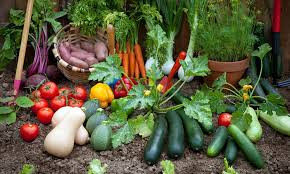Vegetable Gardening
Topic: Vegetable Gardening:

The Joys and Rewards of Vegetable Gardening:
Vegetable gardening is more than just a hobby; it's a rewarding journey that connects us with nature and provides a bounty of fresh, nutritious produce right at our doorstep. Whether you have a spacious backyard or a few pots on a sunny balcony, growing your own vegetables can be a fulfilling and sustainable practice.
Why Vegetable Gardening?
1. Fresh and Nutritious Produce: One of the greatest pleasures of vegetable gardening is the ability to harvest and enjoy fresh produce straight from the garden. Whether it's crisp lettuce for salads, juicy tomatoes for sandwiches, or vibrant bell peppers for stir-fries, homegrown vegetables are unmatched in flavor and nutritional value.
2. Connection with Nature: Tending to a vegetable garden allows us to reconnect with the natural world. From planting seeds and nurturing seedlings to observing plants flourish under our care, gardening provides a sense of accomplishment and a deeper appreciation for the environment.
3. Cost-Effectiveness: Growing your own vegetables can also be a cost-effective way to supplement your grocery shopping. Once established, many vegetables are relatively low-maintenance and can yield a generous harvest throughout the growing season.
Getting Started
Starting a vegetable garden doesn't require a green thumb or vast gardening knowledge; it simply takes a bit of planning and enthusiasm.
1. Choose a Suitable Location: Select a sunny spot with good soil drainage for your vegetable garden.
2. Select Your Vegetables: Choose vegetables that thrive in your climate and growing conditions. Popular choices for beginners include tomatoes, lettuce, carrots, and herbs like basil and mint.
3. Prepare the Soil: Before planting, enrich the soil with compost or organic matter to provide essential nutrients for healthy plant growth.
4. Planting and Care: Follow planting instructions on seed packets or plant tags. Water regularly, provide adequate support for climbing plants if necessary, and monitor for pests and diseases.
5. Harvesting: Harvest vegetables when they are ripe and enjoy the satisfaction of eating produce you've grown yourself.
Conclusion
Vegetable gardening is a fulfilling activity that promotes self-sufficiency, health, and well-being. Whether you're a novice gardener or have years of experience, the joy of planting a seed and watching it grow into a thriving plant never loses its magic. So, roll up your sleeves, get your hands dirty, and embark on your own vegetable gardening adventure – your taste buds and your soul will thank you for it.
Happy gardening!
This blog post aims to capture the essence of vegetable gardening, highlighting its benefits, practical tips for beginners, and the joy it brings to those who practice it.


Comments
Post a Comment